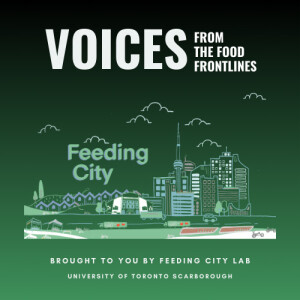
Wednesday May 28, 2025
Episode 25 | A Solidarity Kitchen Connects Health, Hospitality, and Regenerative Farming as It Confronts a Crisis of Hunger
From insight to action at a São Paulo solidarity kitchen. In this episode, Feeding City Lab's Dr. Jo Sharma talks with Dr. Adriana Salay about the crisis of hunger in São Paulo and the pivotal role that a restaurant came to play in providing relief – by building new connections between the worlds of community health, hospitality, and agroecological farming. A professor at the School of Public Health at the University of São Paulo, Adriana is both a scholar and a community-builder. The episode opens with discussion of how Adriana’s historical research on hunger led to her work in advocacy. Adriana explains how modern dietary transitions have shifted consumption away from a key staple – rice and beans – and towards ultra processed foods, less dietary variety, and a notable decline in consumption of different kinds of beans in Brazil. Access to fresh, healthful, nutritious, and culturally appropriate food was already strained for vulnerable communities, but the situation turned to an acute crisis with the onset of the Covid-19 pandemic. Anticipating that people would go hungry, Adriana moved into action. With her husband, Chef Rodrigo, who helmed the kitchen of the acclaimed long-running family restaurant Mocotó, she launched Quebrada Alimentada, a meal program to feed community members in Mocotó’s own neighbourhood. Their efforts have since expanded to include: daily provisioning of delicious, hot meals, based on the model of the restaurant staff meal; monthly distributions of cooking staples such as rice, beans, oil, sugar, corn, flour, and organic local vegetables; and most recently, a new initiative that empowers women in an emerging favela, many of whom lost their homes during the pandemic, by teaching them how to scale up their recipes and build skills in professional cooking. Noting that they made the decision as a small business to invest in the people in their community, Adriana reflects on how they relied on industry peers to bolster resources, connected with food insecure neighbours, cultivated trust, and brought the restaurant’s agroecological farm into the fold. That farm sits on a 40-hectare plot, providing the restaurant with cassava, pumpkin, tomatoes, peppers, and a variety of beans, its soil enriched by compost that goes from the restaurant back to the farm. This conversation was recorded on November 19, 2024, with the assistance of Feeding City Lab’s São Paulo-based student researcher, Catarina Mançano.
[This episode has been lightly edited for clarity. Sound effects sourced from https://www.zapsplat.com.]
For more information on Brazil’s new solidarity kitchens program, which is supported by the Ministry of Development and Social Assistance, Family and Fight Against Hunger, see: www.gov.br/mds/pt-br/acoes-e-programas/acesso-a-alimentos-e-a-agua/programa-cozinha-solidaria
For the legislation (July 20, 2023) that established the food access program and the solidarity kitchen program, see: https://www.planalto.gov.br/ccivil_03/_Ato2023-2026/2023/Lei/L14628.htm
For the decree (March 5, 2024) to implement the solidarity kitchen program, see: https://www.planalto.gov.br/ccivil_03/_ato2023-2026/2024/decreto/d11937.htm
To learn more about the Voices from the Food Frontlines, Sustainable Foodways podcast series, visit the Feeding City Lab at https://www.utsc.utoronto.ca/projects/feedingcity/sustainable-foodways/.
No comments yet. Be the first to say something!